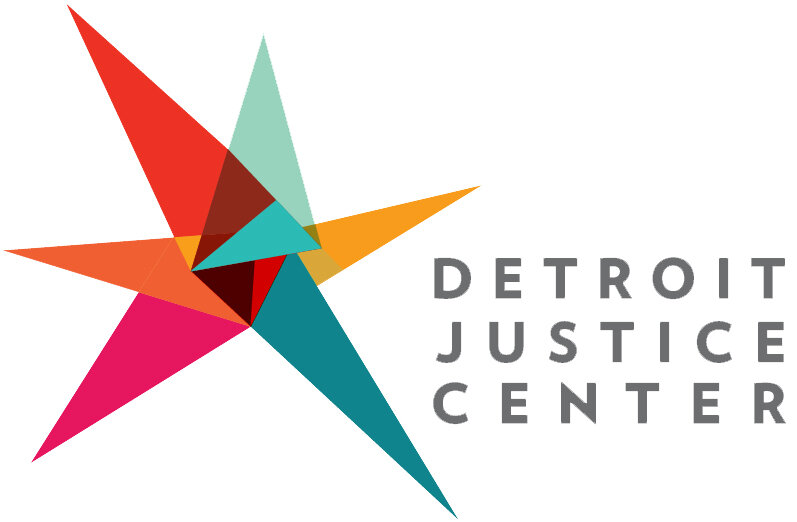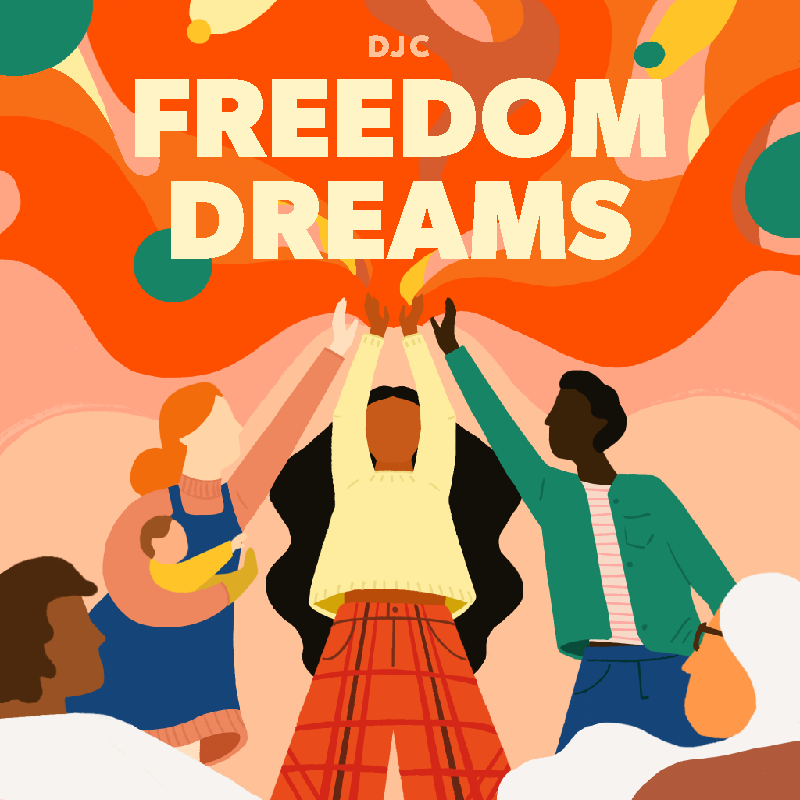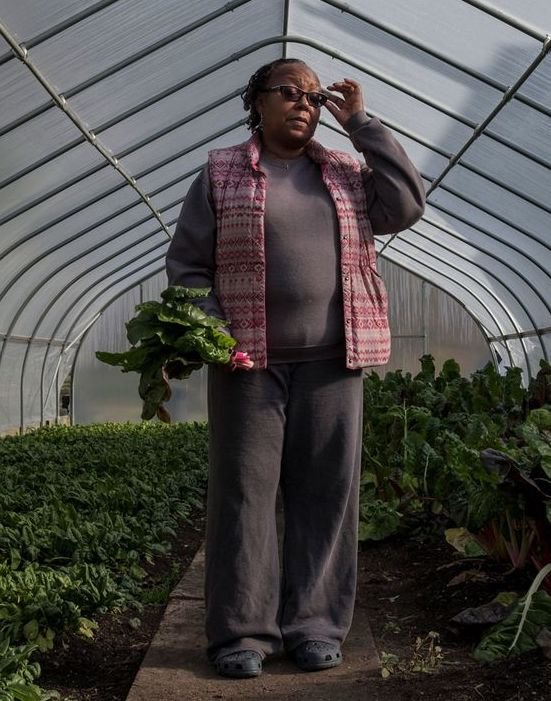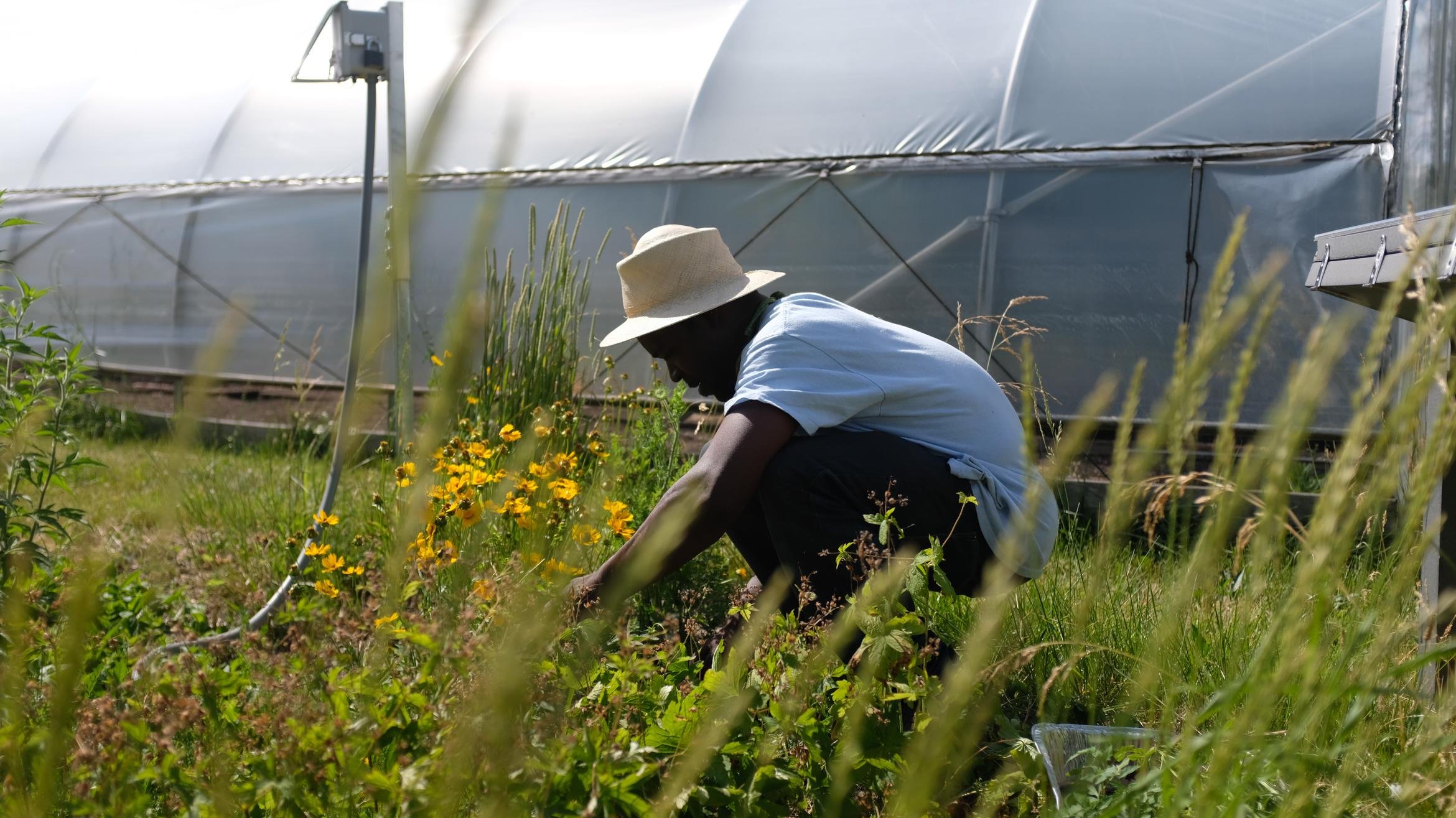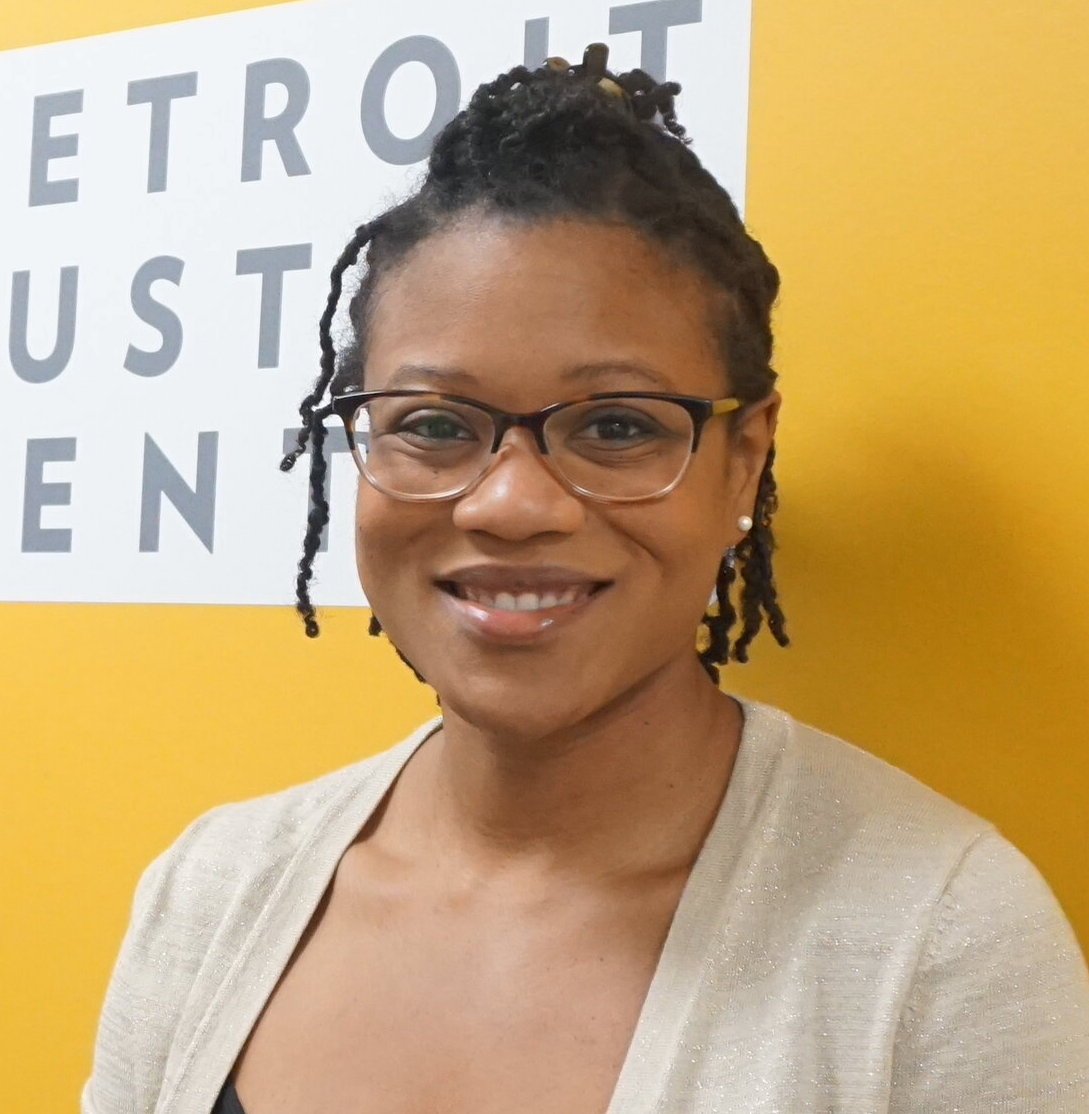In the third installment of Freedom Dreams, we interact with existing cooperative economics models and discuss the real potential for more anti-capitalist economics in our communities. Jerry Hebron of Oakland Ave Farms tells us about the history of cooperative economics in Detroit and its relationship to real estate development while Whitely Granberry talks economic equity and explains community land trusts. Listen in to learn how communities are building alternative economic models right now that empower and sustain by connecting neighbors and building on agriculture histories.
Jerry Hebron is a native Detroiter and product of the Detroit Public School System. Hebron is the current Executive Director of the Northend Christian CDC and Oakland Avenue Urban Farm, located in the Historic North End in Detroit. Hebron is married to William E. Hebron; together the two have 4 children, 11 grandchildren and 3 great-grands. Hebron and her husband work together running the Oakland Avenue Urban Farm where they cultivate people, food and community. Their farm is 6 acres with 3.5 acres dedicated to food production. The mission of the Northend Christian CDC is to provide resources in the North End Community to build a better community. The couple have done this by creating a farm-way that is open to and welcoming to everyone. Bio Credit: The Michigan Chronicle
The Oakland Avenue Urban Farm is dedicated to racially just, local, food systems. You can visit them at the Oakland Avenue Farmers Market or join in their agriculture, food, and music events!
Whitley Granberry is a staff attorney at the Detroit Justice Center’s economic equity group. Whitley focuses on supporting the legal needs of Detroit’s entrepreneurs, small businesses, and nonprofits. After serving in the Peace Corps, receiving her B.A. from Columbia University, and her J.D. from American University Washington College of Law, Whitley returned to Michigan where she worked as a litigator in the Detroit office of Dykema Gossett PLLC. Whitley has worked with clients on a range of litigation matters, including financial services, commercial real estate, healthcare, and municipal disputes. Whitley has also represented clients in real estate development and environmental matters.
Episode Transcript
JERRY: We are at 9227 Goodwin at the Oakland Avenue Urban Farm located in the north end part of Detroit.
AMANDA: I’m Amanda Alexander, founding executive director at the Detroit Justice Center.
CASEY: And I’m Casey Rocheteau, the communications manager at DJC. And this is Freedom Dreams. The podcast where we believe another world is possible and we’re talking to the people who are building it.
JERRY: I’m just somebody doing providing a service, but they call me an activist, Jerry Anne Hebron executive director of the north end Christian community development corporation and the Oakland Avenue Urban Farm.
AMANDA: So today we’re talking about land and building sustainable communities.
JERRY: We’re walking around the farm here on Oakland Ave.
AMANDA: And I’m sure most people have heard about the urban farming movement in Detroit, how grocery stores left the city, but people didn’t want to leave, obviously. So they began to farm.
JERRY: In 2009, we built this out as our beginning garden space.
AMANDA: The nonprofit Keep Growing Detroit estimates that they’re supporting 2000 small farms and gardens in Detroit.
JERRY: Each year we started adding so 2009, we started here. 2010, we expanded over there.
AMANDA: Well, what happens when that land becomes valuable to developers in a way that it wasn’t before? It becomes a classic fight over land and power, who belongs in the city and who doesn’t. And too often, it can end in gentrification and displacement as so many people know in so many cities. It’s a story as old as settlers displacing indigenous people from the land that would become Detroit.
JERRY: We’re like seven minutes north of downtown Detroit. We’re right I-75, the Latch, the Davison, Woodward Avenue? So it’s kind of like we’re right in the middle.
AMANDA: Well, here in Detroit, especially in the north end, people are fighting back. They’re asking now that we have the land, what kinds of communities do we want to create on it? How can we arrange an economy around that? And that’s where cooperative economics comes in.
JERRY: We have six acres in our portfolio and it’s vacant land and structures. And it’s all a part of our Detroit cultivator community land trust.
AMANDA: Detroit is home to so many experiments in cooperative economics. Do you have a favorite example, Casey?
CASEY: I personally love Halima. Because sales has a free store and I love that just as a model. Cause it’s like, I got some stuff that other people might want and I can bring it to the free store and they can just take it. And then I can peruse the free store and, you know, like find an old coat that I really like. It’s like the best kind of vintage shopping.
AMANDA: I remember the first time I saw Halima’s pop-up free store, She just said, you know, take something that brings you joy. So beautiful.
CASEY: Yeah. I’m also a huge fan of the Detroit community technology project and others have set up a series of mesh networks, which is sort of like an isolated ability to get like wifi through connected through like your literal neighbors. And I, as someone who loves the internet, it is so cool to think about my friends setting these up.
AMANDA: Absolutely. Probably my, one of my favorite examples is all the examples of time banking in the city. So time banking is basically a barter system where neighbors have figured out even though it may seem like we’re cash poor or asset poor, we’re certainly not poor in our resources and our ability to support ourselves and each other. So you have neighborhoods where people have, you know, they have set up these elaborate systems to be able to say, I can pay in an hour of plumbing services and I can take out an hour of babysitting, whatever it is, but it’s a way of valuing people and what they bring outside of a traditional capitalist systems. So the Detroit Justice Center’s economic equity practice was set up to support these types of community led experiments in cooperative economics, like community land trusts, and work around cooperatives. And today we’re going to talk to one of the staff attorneys in the economic equity practice, Whitley Granberry. And we’ll also be talking with one of our clients who you’ve already heard a little bit from, Jerry Hebron of Oakland Avenue, Urban Farm, but first another Freedom Dreams, history minute, actually several minutes.
CASEY: So before we dive in with Jerry Hebron and her work here in the north end in Detroit, I wanted to give a little bit of historical context to these kinds of community experiments because they can be kind of buzzy in terms of the way we talk about them and there’s actually a really long history of our communities building systems like this for ourselves. But I wanted to focus in specifically on Fannie Lou Hamer’s Freedom Farm Cooperative, because I think it gives us a really good illustration of a historical example of this, how this kind of setup works. So when we think historically about how we think about shared land, one of the big things that I think about is the context of black folks living in the south as the second great migration is happening. And so, so many people are leaving because there’s big opportunities in the factories here in Detroit and throughout the rust belt. Right? So the second great migration happens 1940 to 1960 thereabout and the people who sort of stay behind in the South…So, I’m thinking specifically for Fannie Lou Hamer, this is in Ruleville Mississippi in Sunflower County. And so they lost about 20% of their population during the great migration, but the folks who stayed behind faced malnourishment unemployment, lack of education, poor housing conditions and voting disenfranchisement and Fannie Lou Hamer herself was told by…she sharecropped on a farm for 15 years. The landowner said to her, look, you either don’t register to vote and you can keep your job and you can keep your land or you register to vote and you got to get out of here and she chose to register to vote and continue to fight for the right for others to register to vote.
ARCHIVAL AUDIO: It was the 31st of August in 1962, that 18 of us traveled 46 miles to the county courthouse in, in the NOLA to try to register to become first-class citizens.
CASEY: So we know a lot about sort of her, her fight in with SNCC and for voting rights. But I think one of the craziest stories I, or like most inspiring stories to me is this freedom farm cooperative, which exists from 1967 to 1976, which she, she started in her local community. So, Amanda, when I say “piggy bank,” what comes to your mind?
AMANDA: A few things. I mean, I think of those you know, where kiddos store their coins. But I think you might be thinking about a pig bank here and Fannie Lou Hamer’s version of a pig farm?
CASEY: Yes. So I love this story. So essentially what happens is it’s a collective of all these families who have been disenfranchised and sort of left off their land, automation is happening and they get donated I think it’s like 135 pigs and the idea is a hundred different families each get a pig and it’s, it’ll be a female pig and it’s not, they can eventually, you know, like sell it for meat, use it for meat, whatever they want, but at first they breed the pigs and then they have to give two piglets back to the pig bank. So within three years they go from, you know, a little over a hundred pigs to like 850 families having pigs. So it was just a wild sort of a need, especially because at this point, the freedom farm collective is sustenance farming. They’re really making sure that everybody who’s part of their community can get fed whether or not they can work on the farm. And so to me, that’s, that’s really coming out of seeing what the need is and, and meeting it in a way that makes sense and can be regenerative. I think of it as like the, the way we think of like a revolving bail fund, this is like a revolving pig fund. And they also had a housing initiative with about 80 houses for people because for the most part, that housing conditions weren’t great. So they built about 80 houses and they were also able to through the sustenance farming, this really reminds me actually, of Jerry, any surplus food they had, they would not only give it to the folks in their community, but they were able to ship it to folks who had moved during the great migration. So they’re sending vegetables as far away as Chicago to make sure that their people still get fed, even though they’ve moved away. Why it reminded me of Jerry is I’m just thinking about how she’s been taking food from restaurants that can’t sell it right now during the pandemic and just making sure that it doesn’t go to waste and it goes to people who need it
AMANDA: After a break, our conversation with Whitley Granberry of economic equity practice at the Detroit Justice Center and our client, Jerry Hebron of Oakland Avenue Urban farm,
———
Douglas Manigault III: I’m Douglas Manigault III and I’m the associate director of development at the Detroit justice center. As a fundraiser. I enjoy connecting people with DJC’s mission. What’s unique about this organization. We directly represent clients and also advocate for legal and policy changes that would benefit them. We run a restorative justice network, help Detroiters appeal their property tax assessment and help create community land trusts. We even have an artist residency program. We understand that incarceration impacts every single aspect of our lives. So it takes a robust and diverse team to combat the criminal punishment system. Join us in the fight to create truly just cities, where every life is held in equal regard by visiting detroitjustice.org/donate.
———
CASEY: So our first question, which I think is for both of you is: what is cooperative economics and how does it apply to your work?
JERRY: Okay, so I’m old school. So what I mean by old school is co-operative economics is not a new term or a new model for me because growing up at a time when I did in the 50s and the 60s co-operative economics was a very, was very much so a part of my community when, what I mean by that is we lived in Black Bottom and then we moved into the north end part of Detroit, where I live and work. Now people grew their food in their backyards and they shared their foods up and down the street round the corner. So hunger was not necessarily something that I was familiar with. Our neighbors who had children the same age as us, we shared clothing, you know? So, if I grew out of something, one of my neighbors got my clothes or, you know what I’m saying? So it was, it was always a matter of sharing and caring within our community with what we had. In terms of co-operative economics as I look at it today, I think differently about it and that we’re able to come together and build, you know, shared decision-making, shared resources, shared experiences, shared skills, and then those tools are used to build the business that supports a community. So I don’t know if that makes sense, but that’s, that’s kind of the lens that I look at it from today.
WHITLEY: Yeah, no, that makes perfect sense, Jerry, cooperative economics is like a big term sometimes to kind of break down for everyone to understand. But so you hear a lot of things that kind of play together in this world of cooperative economics and the sharing economy, solidarity economics, but basically it’s sort of an anticapitalist form of economics, um, based on sharing ownership and sharing ownership of land, right? Like it’s the case with community land trusts sharing ownership of businesses, right? So when you’re making businesses, not only the top few owners or the top few shareholders get profit that comes into the business, but everyone, um, has the opportunity to become an owner and to share in that economy, to share in those profits. It’s about democratic governance too, is a key concept that kind of comes in there so that everybody has, um, an equal vote and an equal say to what’s happening. And when you get into cooperative economics, it really is about an anti-racist dominant anticapitalist economy.
AMANDA: Awesome. Jerry, can you tell us the story of Oakland Avenue Urban Farm? How did it come together and what led you down that path?
JERRY: Yeah, that’s a, that’s an interesting situation being as I come from that capitalistic background of being a realtor, where I was chasing money and, and you know living my life in a way that you know, I could just about go wherever I wanted to go, buy whatever I wanted to buy. In 2008, the real estate market turned upside down and even prior to that, in 2007, my daughter had had a massive stroke at 40. And so I was already on the path to kind of changing and rethinking my life in terms of the next steps, because I, I stopped to take care of her in 2007 and then the real estate market went upside down in 2008, causing my husband and I to close our office. You know, we lost all of our, our realtors that were working for us and took a big hit financially. Also during that time, my mother, who is the president of the nonprofit, was seeking someone to come over to the nonprofit side, to, to, to kind of re-engage the, the nonprofits in the community. The nonprofit had been dormant for about two years. My mother was aging and just didn’t have the energy to do it. So we closed our real estate office, you know, went home to lick our wounds. And we thought that was going to be it. And I get the call from my mom saying, “Hey, I need you to come over and run this nonprofit.” And I’m like “A nonprofit, really?” And, and so when I, when I came back to the north end and saw the devastation, because we lived in another community, I saw the devastation and the, and what I mean is that it was a very dangerous neighborhood. It was dark and gloomy. There was high unemployment, high crime, poor housing, healthy food was non-existent. And talking with people in the community, that’s what they told me. We need food, housing and jobs. And I was heartbroken because this was not the neighborhood that I knew. This was not the neighborhood that I remembered. And I had to ask myself, “What can I do to change the existence of this community, reinvent this community? You know, what, what role do I play? Can I play and make a difference in this community?” And so after talking to a lot of people–I still have had friends that lived there–I started attending meetings and trying to connect to resources because the nonprofit did not have any money. And just to leverage relationships and, you know, collaborate with some folks. And, you know, we didn’t have like organizational planning or strategic planning to say, okay, we’re going to do this, this, this, and this, you know, we would just wait and see what the opportunities would be. And it became the desire and mission of the organization to secure as much land as possible. Because what we saw is that people who did not look like us were moving into the community and they came with resources that, you know, people like us did not have, and we’re changing not only the narrative of our community, but also the way that our community felt, you know, there was a lack of culture and experiences. And, and so we, we were like, our neighborhood is becoming gentrified and people are experiencing displacement. So we need to secure as much land as possible and figure out how can we do affordable housing, bring in some retail businesses that is affordable because businesses downtown Detroit, Midtown are being displaced and looking to the north end as maybe the next affordable community for them. And so that’s the work that we kind of are doing now. That’s the snapshot.
AMANDA: Jerry, then how did the idea for a community land trust come about?
JERRY: It had been something that we had talked about probably for about four years off and on. And then I went to a workshop that Eric Williams gave over at Northwest activity center. And I was blown away because the room was overflowed. There were people out wrapped around the hallway and sitting on the floor, you know, and trying to hear what Eric was talking about. And it was such an amazing response that I was like, you know, this really may be something that we could do at our organization. And that same…the next February, I went to Albany, Georgia. I spent three days in a workshop down there with Shirley Sherrod and, you know, learned about the work that she has done with the name of her. And again, I’m blanking but she has, she, she and her husband form this community land trust like 50 years ago, over 50 years ago in Albany, Georgia to help rural farmers and people in the rural communities, people of color hang on to their land. And it was, it was so inspiring to be with her, to hear her story and the work that they are doing to uplift the rural farmers, to help them get to the marketplace and how this land trust was developed. And I was like, this is basically the same thing that’s happening in Detroit with displacement, with housing and retail, you know, and people being able to be a part of the marketplace. So I came back from Albany, Georgia in February, just energized. And we started our work and we reached out to the Detroit Justice Center. And here we are today, a year and a half later we are legally the Detroit Cultivate a Community Land Trust, and we are on our way to developing our first board. We have six acres of land, so it’s amazing.
CASEY: It is, and thank you. That’s I think, great context. Whitley, do you want to talk a little bit about your work and building community land trusts as somebody who works for the Detroit Justice Center, and this is sort of your wheelhouse?
WHITLEY: Yeah, sure. So Jerry mentioned also Eric Williams. So shout out to Eric, who is the senior staff attorney on, in our practice group, which is called the economic equity practice. So I’m the, by default, the junior staff attorney on the team we’ve had some really monumental successes so far, I would say we’ve a few different groups who are really piloting the way Detroit now has its first it’s first two official community land trusts. One of which is Detroit Cultivator Community Land Trust, which Jerry is a part of and helps meet its temporary board right now. So yeah, I mean, the work is interesting. It’s a lot of work talking to people, right? Because these are real community members and actual neighborhoods. It’s a lot of community engagement because when you’re dealing with property like this and land, I mean, it’s just interesting that you need to know your neighbors, your neighbors need to be on board.
CASEY: So our podcast is called Freedom Dreams. And so we’re wondering what are your freedom dreams for your work? Like what do you, 20, 50, a hundred years from now hope that the legacy of what you’re doing is?
JERRY: Well, that’s, that’s really deep. For me, when I look out that far, I’m hoping that people have reconnected to their agricultural roots. And what I mean by that is being born in Tennessee, I was born in Lebanon, Tennessee, everybody I knew in my family and in the town that I was born in, had a garden and, or a farm, and they had chickens and they had all kinds of other stuff. And we got disconnected with a lot of that when we came to the north and became, as my grandmother would call city-fied, you know? And so becoming city-fied with we weren’t touching the soil, we weren’t feeling the healing values that come out of the soil. And we were not utilizing the things that are grown in the soil to heal our body. And I hope that 50 years from now we will go, we will see that people have gone back to that and that they are utilizing the earth as God intended that to be, you know, and, and, and, and living a better quality of life. That is my hope that is my dream, I mean, we have everything that we need and it’s really simple. And life can be so less complicated if you just appreciate those simple things that we have readily accessible to us.
WHITLEY: I have a lot of freedom dreams guys, so I’m going to try to keep it short so that we’re not here all day. But what does it look like? So the first thing I said is it looks like longtime residents of the city who were here before, I don’t know, maybe before 2008, before the city got popular again, before, you know, people wanted to redevelop it into what is it? People started calling it like a blank slate, all these mildly offensive terms, people were using. All people who were there before that, I hope that in my freedom dream, I see them being taken care of. Right? So number one, like city services that are working the way we want them to be working, the jobs provided to people that are paying living wages ideally, right, where every single person is told every single person has healthcare and benefits. You know, Switzerland just moved their minimum wage up to the equivalent of $25 an hour. Like we can hit, you know, $17, something like that, local businesses, right? So money being spent at businesses that are also in our community and then going, being paid out to owners and employees that are living in our communities. Also, what else does that look like? It looks like everyone having a home, it looks like food access, right? Looks like more fresh food. It looks like more Detroit cultivators. It looks like more open avenue, urban farms around the city. It looks like people valuing the voice of children and listening to them more and what they have to say as well as our elders and probably more if I kept thinking, but I would say that’s a starting point.
CASEY: You just heard Whitley Granberry, an attorney at the Detroit justice center and Jerry Hebron who runs Oakland Avenue Urban Farm in Detroit’s north end.
AMANDA: Freedom Dreams is a production of the Detroit Justice Center. Special thanks to our team, Zach Rosen, our producer, as well as Lawrielle West and Elana Maloul for research and assistance.
CASEY: The Freedom Dreams theme song is by Ashantee, artwork is by Gunnar and Hobs. If you want to learn more about today’s episode, head to freedomdreamspodcast.com, where you can send in your freedom dreams.
AMANDA: You can also write to us on social media. We’re freedomdreamspod on Instagram and freedomdreampod on Twitter.
CASEY: If you feel compelled to donate to the work we do, you can find us at detroitjustice.org/donate.
AMANDA: And lastly, if you love this show and want us to find a wider audience, please leave us a rating or review at apple podcasts.
